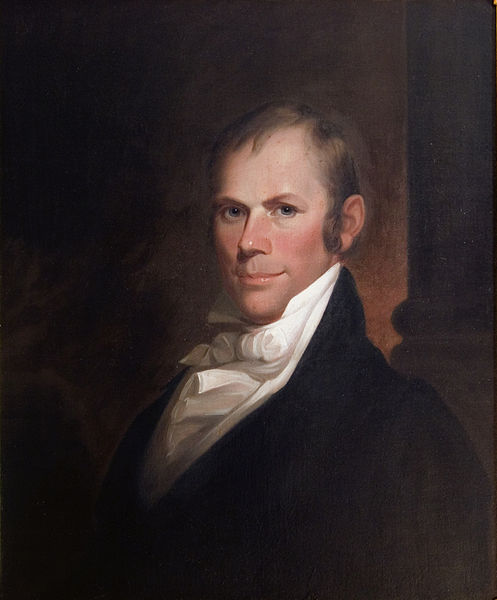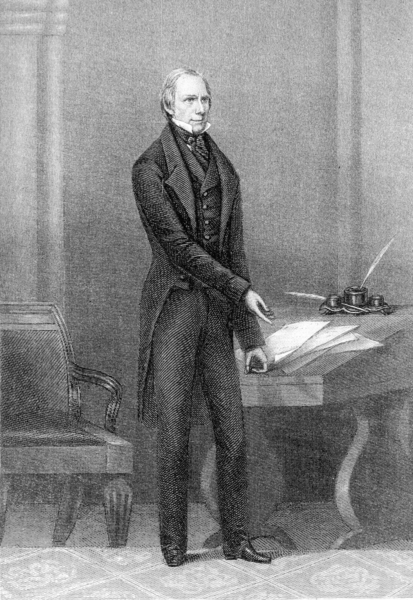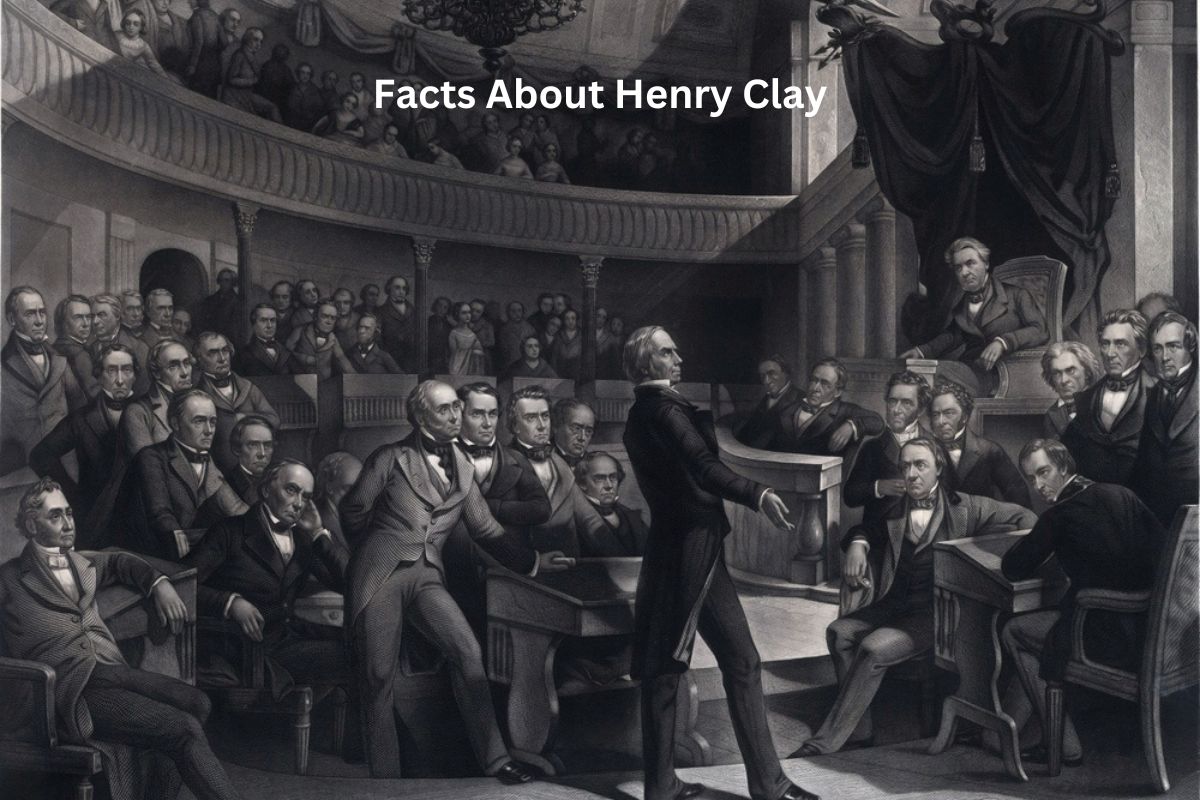Henry Clay, born in 1777, was a prominent American statesman and politician who played a pivotal role in shaping the United States during the 19th century.
Known for his eloquence, political acumen, and ability to forge compromises, he earned the nickname “The Great Compromiser.”
Over the course of his career, Clay served as a U.S. Senator, Speaker of the House of Representatives, and a key figure in mediating critical legislative compromises such as the Missouri Compromise and the Compromise of 1850.
Despite several unsuccessful presidential bids, his legacy as a peacemaker and advocate for economic policies known as the American System endures in American history.
Henry Clay Facts
1. Born on April 12, 1777, in Virginia, USA
Henry Clay was born on April 12, 1777, in Hanover County, Virginia. He was born into a farming family, and his childhood was marked by modest means and limited access to formal education.
Also Read: Timeline of Henry Clay
His early life experiences instilled in him a strong work ethic and a commitment to self-improvement, which would serve him well in his later career.

2. Became a successful lawyer and skilled orator
After moving to Lexington, Kentucky, Clay began studying law under the guidance of George Wythe, a prominent Virginia lawyer.
He quickly established a successful law practice in Lexington, earning a reputation for his sharp legal mind and eloquent speaking skills.
His ability to articulate arguments and persuade juries earned him the nickname “The Great Compromiser” and made him a formidable presence in both legal and political arenas.
3. Served as a U.S. Senator from Kentucky
Henry Clay’s political career began when he was elected as a U.S. Senator from Kentucky. He first served in the Senate from 1806 to 1807, and then again from 1810 to 1811.
Also Read: Facts About the Compromise of 1850
During his time in the Senate, he advocated for the interests of Kentucky and became known for his strong support of western expansion, internal improvements (such as roads and canals), and protective tariffs to promote American manufacturing.
These early years in the Senate laid the foundation for his future leadership in national politics.
4. Held the position of Speaker of the House multiple times
Henry Clay served as the Speaker of the U.S. House of Representatives for multiple terms during his political career. He held this influential position from 1811 to 1820 and then again from 1823 to 1825.
As Speaker, he played a crucial role in shaping the legislative agenda, facilitating debates, and maintaining order within the House.
His leadership and ability to build coalitions made him a powerful figure in the House of Representatives and allowed him to advance his policy agenda, including his support for the American System.

5. Advocated for the American System economic policies
Henry Clay was a strong proponent of the American System, a comprehensive economic program aimed at promoting American industrial and economic growth.
This system included three main components: a national bank to stabilize the economy and manage currency, protective tariffs to shield domestic industries from foreign competition, and internal improvements (such as infrastructure projects) to facilitate transportation and commerce within the United States.
Clay believed that these policies would foster economic development, unite the nation, and reduce its dependence on foreign goods.
6. Played a key role in the Missouri Compromise of 1820
One of Henry Clay’s most significant accomplishments was his role in brokering the Missouri Compromise of 1820. At the time, there was a growing divide between slaveholding and free states in the United States.
The Missouri Compromise temporarily resolved this tension by admitting Missouri as a slave state and Maine as a free state, thereby preserving the balance of power between the two factions in the Senate.
7. Brokered the Compromise of 1850 to ease sectional tensions
Henry Clay’s involvement in the Compromise of 1850 is another notable achievement in his political career. By 1850, tensions over the issue of slavery had intensified, particularly due to the acquisition of new territories following the Mexican-American War.
Clay stepped out of retirement to propose a comprehensive package of legislation to address these issues. The Compromise of 1850 included several key elements: California was admitted as a free state, the territories of New Mexico and Utah would determine the issue of slavery through popular sovereignty, the slave trade was abolished in the District of Columbia, and a stricter Fugitive Slave Act was enacted.
Additionally, the compromise established a line of demarcation, known as the 36°30′ parallel, which delineated where slavery would be allowed in the territories of the Louisiana Purchase. This compromise, orchestrated by Clay, helped maintain peace and stability in the Union for a time.
While the Compromise of 1850 was not a lasting solution to the slavery question, it temporarily eased tensions and postponed the outbreak of the Civil War for a few years.

8. Ran for president unsuccessfully three times
Henry Clay ran for the presidency three times during his career but was unsuccessful in each attempt. He was the National Republican candidate in the 1832 election but lost to Andrew Jackson. In 1844, he ran as a Whig candidate but narrowly lost to James K. Polk.
Finally, in 1848, he was the Whig candidate again but lost to Zachary Taylor. Despite his significant influence and accomplishments in the political arena, Clay was never able to secure the presidency.
9. Engaged in a duel with John Randolph in 1826
In 1826, Henry Clay was involved in a notable duel with fellow Congressman John Randolph of Virginia. The duel was the result of a heated political dispute between the two men.
However, neither Clay nor Randolph was injured in the duel, as both men intentionally aimed wide. The event, while non-lethal, highlighted the intense personal and political rivalries of the time.
10. Known as “The Great Compromiser” and left a lasting political legacy
Henry Clay left a lasting legacy in American politics. He is remembered as “The Great Compromiser” for his skill in negotiating and mediating political conflicts during a turbulent period in American history.
His work on the Missouri Compromise and the Compromise of 1850 helped preserve the Union for a time and delayed the outbreak of the Civil War. Clay’s advocacy for the American System also had a lasting impact on American economic policy. His dedication to public service and his ability to bridge political divides continue to be celebrated in American history.
